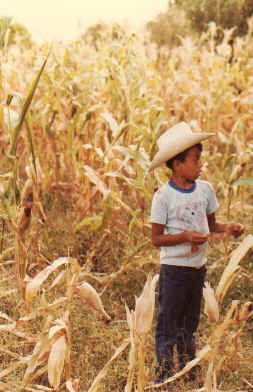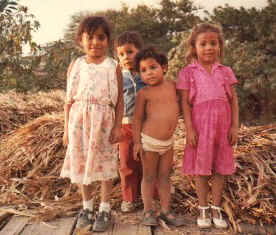 Consider the following examples of how peasant economic logic can be different from capitalist economic logic in ways that can have significant consequences.
Consider the following examples of how peasant economic logic can be different from capitalist economic logic in ways that can have significant consequences.
A Different Economic Logic
 Consider the following examples of how peasant economic logic can be different from capitalist economic logic in ways that can have significant consequences.
Consider the following examples of how peasant economic logic can be different from capitalist economic logic in ways that can have significant consequences.
Increasing output when market prices fall
Family labour is not paid. So extra work does not add to the money costs of production. Its cost, Chayanov argued, could only be measured subjectively, in terms of drudgery and hardship. If family needs remain unsatisfied, then the cost of working harder will be less than the satisfaction derived from producing a little more, however much toil and sweat it takes.
Suppose, for example, that the peasants have to meet some of their necessities by selling part of their harvest, or that they have to pay a fixed tax in money. If the price of their crop falls, their income falls. Assuming they could only just meet their needs for cash previously, then they can only either reduce their consumption or produce more of the crop, to earn the same total income at the lower price. In capitalist terms, they may be operating at a loss: that is, if they actually had to pay for the extra labour in money, then the extra value of the total product might be eaten up by the increase in production costs. And capitalists have to have a worthwhile profit left over after meeting the wage bill.
But if peasants are willing to increase what Chayanov called their rate of self-exploitation, they can survive in a depressed market. As a result of this, peasant family farmers have sometimes succeeded in driving capitalist farmers using wage-labour out of business, by producing more and creating further downward pressure on prices, to levels which are uneconomic for capitalists.
They can only do this, however, where the burden of tax and rent upon them is not so crushing as to make it impossible for them to meet their basic needs after paying their taxes and rent however hard they work. This is what happened in parts of colonial South East Asia — prices were low and tax and rents so high that peasant farmers often went under. In large parts of continental Europe, however, it was more often the big capitalist farmers who went under when industrial manufacturing interests persuaded their governments to lower tariffs against grain imports from the USA, Argentina and Russia in the late 19th century. This is why much of European agriculture was dominated by smallish family farms rather than big wage-labour farms earlier in this century. It is rather striking that large-scale plantation capitalism seems to be concentrated in protected or monopoly markets and in Third World regions where wage-levels are extremely low.
 Hunger Rents
Hunger Rents
Secondly, let's assume, as Chayanov did, that land is in short supply, and there are no alternative forms of employment open to the peasant family. The peasant family may have more members than it can use on its own land, but it still needs to meet its minimum consumption requirements. Under these circumstances, peasants will be willing to pay a tremendous price to rent land in order to make that labour productive. All that is required is that the rent paid leave something over as a contribution to family subsistence: that something is worthwhile even if it's quite a small net addition to income after the rent or taxes have been paid. The willingness of peasants to pay these ‘hunger rents’ may again drive capitalist renters out of the market, because rental levels are uneconomic for a business which has to make a profit after paying wages to its labour force.
It is clear, of course, that both these cases depend on special assumptions which are not true of all peasants — like shortage of cultivable land and absence of possibilities to make a better living by migrating. What is interesting about Chayanov is, however, that he offers us a theory of how peasants may be able to survive a considerable amount of capitalist development of the economy. And he also offers us a theory of how peasants may be able to survive really difficult economic conditions by increasing their exploitation of themselves. This has an obvious bearing on the problem of how peasants managed to survive in conditions of dire poverty in Third World countries.